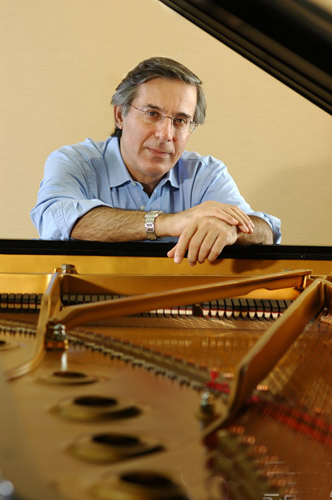Chicago Philharmonic leads off with vibrant (mostly) Brazilian program

While the Chicago Symphony certainly occupies an elite place all its own, it is part of an archipelago of area orchestras large and small, each with its own raison d’être.
Among these other ensembles is the Chicago Philharmonic, which was founded in 1988 by a group of principal musicians from the Lyric Opera of Chicago and now draws on top players from across the region. Among its drawing cards are the relative intimacy and accommodating acoustics of its main venue–Northwestern University’s 989-seat Pick-Staiger Concert Hall in Evanston.
Although not in the same league as the CSO, the Philharmonic is nonetheless a very good orchestra, as it demonstrated again Sunday evening during the opening performance of its 2012-13 season.
Offering a refreshing break from conventional concert fare, the orchestra devoted the first half to three Brazilian works, steering clear, interestingly enough, of the one composer from that country that most people know: Heitor Villa-Lobos. Instead, working with Brazilian-born guest conductor Alex Klein (familiar to Chicago audiences as the CSO’s principal oboist from 1995 to 2004), the orchestra assembled a fascinating trio of works by three little-known composers – Antȏnio Carlos Gomes, Osvaldo Lacerda and Liduino Pitombeira.
The program opener was the lively if not especially distinctive overture to Gomes’ Il Guarany, a rarely produced 1870 nationalist opera that owes an enormous – probably undue – debt to Giuseppe Verdi. Klein was technically proficient and clearly well prepared, but his conducting here and at several other points during the evening sounded somewhat prescribed and constrained.
The highlight of the first half came with the second piece, the Oboe Concerto by Lacerda, who was Klein’s composition teacher at São Paulo State University. He wrote this work for the oboist, who premiered it in 2005, just six years before the composer’s death.
About 20 minutes in length, the three-movement work is modest in scale and scope – no grand architecture or ground-breaking experiments. Though tinged at times with whiffs of melancholy, it has a relaxed, easy-going feel overall that varies little from section to section. In his introduction, Klein noted that Lacerda studied with Aaron Copland, and that influence was apparent at times, especially in the quiet, gently wistful beginning.
Klein was forced to leave the CSO because he was diagnosed with the neurological disease, focal dystonia, which denied him the consistent finger control he needed to play in the orchestra day to day. But no effects of that condition were obvious Sunday evening. The concerto is not exactly a showpiece, but it offers technical challenges aplenty for the soloist as well as a substantial cadenza at the end of the first movement.
Klein was in superb form, seeming completely at ease and playing with compelling expressiveness throughout. Most impressive was his handsome, pure tone from the full-bodied, reedy lower register through the more airy upper notes. Serving double-duty as soloist and conductor in this work actually worked to his favor, because it gave the orchestra a bit more freedom, and the result was a looser, more natural-sounding interpretation.
Ending the first half was Seresta No. 7 by Pitombeira, composer in residence at the Paraiba Symphony Orchestra where Klein is chief conductor. A kind of mini-tone poem, it plunges listeners into an unsettled, sometimes brooding sound world with elusive suggestions of Brazilian urban dances. Though there are a few striking moments, including a brief, emphatic piano solo punctuated by chimes, there is little that is especially original. It didn’t help that this piece was taken from a larger cycle, and it sounded out of context here, ending in such an odd, abrupt way that Klein had to turn around and gesture to the audience that it was all right to applaud.
To counterbalance the unusual selections on the first half, the Philharmonic offered a work on the second half that could hardly be more familiar – Piotr-Ilyich Tchaikovsky’s Piano Concerto No. 1. Continuing the Brazilian flavor of the concert was the soloist, who is a native of that country – Arnaldo Cohen. Though he might not have the name recognition of some of his peers, he is, as his playing here made clear, a first-rate pianist.
Possessing all the power, technical acumen and dramatic flair this piece demands, he delivered a big, vibrant performance. He conveyed its full romantic sweep from the thunderous chords of the first all-encompassing first movement to the delicate, almost dreamy passagework of the second to the driving momentum of the finale. Klein and the orchestra provided solid accompaniment, with some notable touches like Jean Berkenstock’s striking flute solo at the beginning of the slow movement.
Posted in Performances




